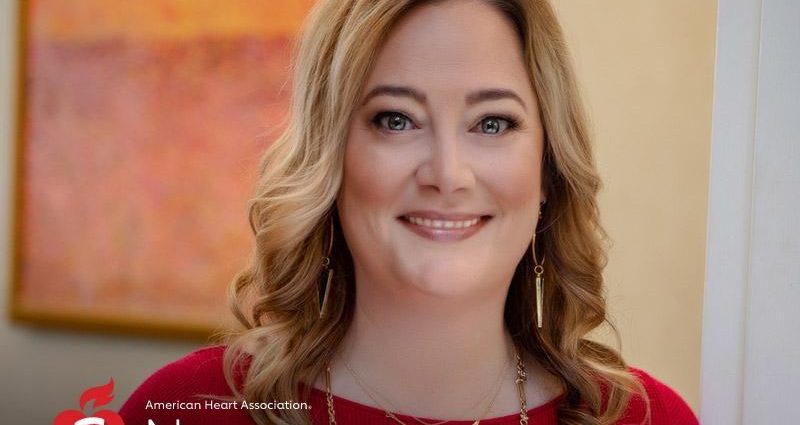FRIDAY, Nov. 4, 2022 (American Heart Association News) — Intense chest pain awakened Natalie Latham from a deep sleep. Surely, she figured, it was from the spicy soup she’d eaten the night before.
Natalie had worked a full day in her role as marketing director for a bank in Brandon, Mississippi, then took one of her sons to baseball practice. Afterward, they picked up dinner from one of their favorite restaurants.
She expected her spicy meal and the late dinner hour to activate the acid reflux she’d battled for years. Knowing she had to be up early the next morning, Natalie took her nightly antacid and went to bed.
When the pain jolted her awake, she took more antacids and started pacing the bedroom floor, hoping the discomfort would subside. But this felt different from her usual acid reflux flareups. Along with extreme chest pressure, Natalie felt as if someone was kicking her between the shoulder blades with the heel of a boot.
“Jason, something’s not right,” she told her husband.
He considered her symptoms.
“Natalie, I think you’re having a heart attack,” he told her.
That couldn’t be right, Latham thought to herself. She was just 40, and she’d gotten a clean bill of health at her annual checkup days earlier.
At the hospital, an electrocardiogram showed no problems. But a blood test revealed elevated levels of troponin, a strong indicator of a heart attack.
“We need to get you to the cath lab right away,” a doctor told her.
There, cardiologists found a 99% blockage in her left anterior descending artery that was restricting blood flow to a large portion of her heart.
Natalie was groggy but awake during the catheterization procedure. She was able to see on a screen what doctors were doing.
“It was the most surreal moment of my life, watching someone work inside my heart,” she said.
Doctors placed a stent in the artery to open the blockage.
She spent one night in the hospital. Though feeling better, she was anxious about the future. She became determined to lead a healthier lifestyle.
Doctors told Natalie that her family history along with her diet likely contributed to her heart attack. (It wasn’t until after her heart attack that she learned her maternal grandfather also had one at age 40.)
Between work and family commitments, Latham often ate on the go and exercised sporadically. She knew that had to change.
“At first I was scared to eat,” Natalie said. “I couldn’t just go to a plant-based diet that doctors recommended. That restrictive of a diet isn’t practical for my family.”
Over the next 10 weeks, Natalie went through cardiac rehab and worked with a nutritionist. The program included exercise and nutrition education that was geared toward heart health.
“The nutritionist brought so much awareness to what I’d been eating and what great, heart-healthy substitutions are available,” Natalie said. “We even went to the grocery store together – she taught things like shop the perimeter to find the healthiest options,” such as fresh fruits and vegetables.
Natalie learned to cut way back on red meat. The family of four now eats mostly grilled chicken. They’ve also reduced carbohydrates. When Natalie goes out to lunch, she gets a wrap instead of a sandwich and forgoes a bag of chips, which used to be standard. She’s also made substitutions such as using yogurt-based salad dressings.
You don’t realize what’s in the foods you eat until you’re tracking it, she said. “Almost a year and a half in, and I’m still figuring it out.”
Natalie, now 42, is exercising more, mostly walking and using a stationary bike. She has lost about 10 pounds.
“I’m just trying to make a lot of little changes, both at home and while on the go,” she said. “Before, I never really thought about it. As a career-driven woman with a family, it’s really hard to prioritize the time to make healthy choices within our active family lifestyle, but I’m learning to figure it out.
“There’s some fear in the back of my mind that I’ll have another heart attack, but I just have to quiet those fears and make changes,” Natalie said.
Her experience, she said, demonstrates the prevalence of heart disease – the country’s leading cause of death for women and men.
“I realize my story isn’t that unique, but I think that’s what makes it relatable to so many,” she said. “It’s definitely brought awareness to my friends and family.”
One of those people is Molly Martin, who works for Natalie.
Martin, 30, has a family history of heart disease and was already on a mission to exercise more, eat better and lose weight. Natalie’s experience helped Martin better understand the importance of a healthy lifestyle.
“As much as Natalie’s heart attack was life-changing for her, it really impacted everyone here at work,” Martin said. “I think we all made changes in our own ways. It was definitely a wake-up call to be more aware of our heart health.”
American Heart Association News covers heart and brain health. Not all views expressed in this story reflect the official position of the American Heart Association. Copyright is owned or held by the American Heart Association, Inc., and all rights are reserved. If you have questions or comments about this story, please email editor@heart.org.
By Diane Daniel, American Heart Association News
Copyright © 2026 HealthDay. All rights reserved.

